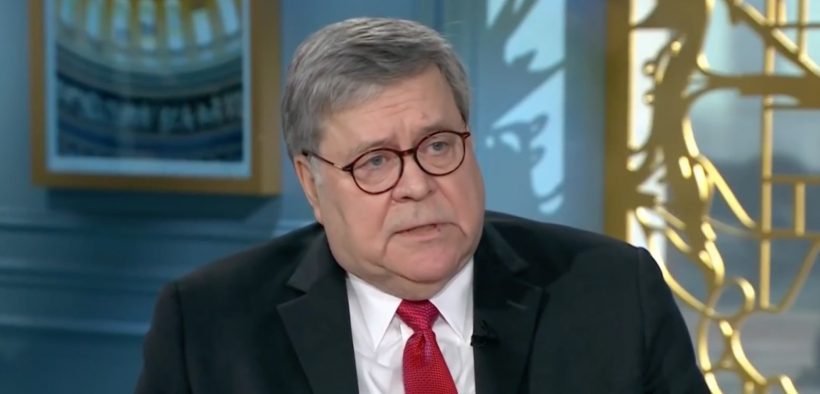NYT’s Hit Job on Barr and Durham Fizzles
Share

What once proudly called itself the country’s “paper of record,” the New York Times, has sunk to a new low in tabloid journalism. A recent front page article relies on half-truths and innuendo to attack former Attorney General Bill Barr and Special Counsel John Durham. Their sin, according to the Times, was that they conducted an investigation into the origins of the Russia hoax that failed to convict anyone of a major federal crime. We should applaud the integrity of our system of justice when an investigation into the misdeeds of the opposing party does NOT result in partisan indictments, but no — according to the Times’ twisted logic, there must be something wrong if the Justice Department under Trump failed to find evidence to indict Hillary Clinton’s campaign for something!
There are so many distortions in the Times article that it is hard to know how to begin. Start with the headline: “How Barr’s Quest to Find Flaws in the Russia Inquiry Unraveled.” No, it wasn’t a “quest” to “find flaws” in the Russia inquiry; it was an investigation into whether federal crimes had been committed. Those are very different. The principal crime that might have been committed by the Hillary Clinton campaign was conspiracy. Conspiracy is defined by federal statute as an agreement among multiple parties “either to commit any offense against the United States, or to defraud the United States, or any agency thereof in any manner or for any purpose.” The sine qua non for a conspiracy is an agreement to commit a crime; if there is no such agreement, there is no conspiracy. Concluding that there is insufficient evidence to support indictments for an agreement to commit a crime is a far cry from concluding there were no “flaws” in the inception of the 2016 investigation as to whether Donald Trump was a Russian agent or “colluding” with the Russians. It is very hard to prove the existence of an agreement to commit a crime without either a witness who turns state’s evidence or a wiretap proving the existence of such an agreement.
In any case, even if there were an agreement, what would be the federal crime? It is undisputed that the Hillary Clinton campaign paid for the “Steele dossier,” a collection of unsubstantiated rumors about Trump, and then a lawyer who worked for the Clinton campaign took it to the Department of Justice, which used it as part of the basis for getting warrants to surveil people associated with the Trump campaign. Then various prominent Democrat politicians including Nancy Pelosi and Adam Schiff stated to the voting public that the Russians “had something” on Trump or that he was “colluding” with the Russians. The Clinton Campaign paid a measly $113,000 fine for violating federal election laws by covering up its funding of the Steele dossier, a fact conveniently omitted from the Times article. Were the events just dirty politics or do they rise to the level of a criminal conspiracy to defraud the United States?
Perhaps “there ought to be a law” against the political tactic of manufacturing a spurious basis to investigate your opponent, using it to persuade the FBI and DOJ to investigate him or her, and then leaking to the press the existence of such an investigation. But it is debatable at best whether there is anything criminal in that under current law. On the contrary, the courts currently hold that lying about your political opponent is protected by the First Amendment. Taking your suspicions to the FBI could be a crime, but only if you knew that the allegations were false.
That’s why we have congressional oversight as well as criminal investigations. It is the role of Congress to expose politically motivated “flaws” in the inception of investigations of opposing presidential candidates even if they cannot be proven to rise to the level of a criminal conspiracy.
The New York Times piece is not serious journalism that grapples with the difficult questions presented by the Clinton campaign’s role in generating the great Russian hoax of 2016-2020. On the contrary, the Times focuses on trivialities such as that Barr and Durham allegedly had dinner together on several occasions and “drank Scotch,” or that two of Durham’s underlings allegedly disagreed with some of his tactical decisions.
Admittedly, a DC jury acquitted Clinton lawyer Michael Sussmann of lying to the FBI when he allegedly said that he was coming to the Bureau with the Steele dossier as a concerned citizen even though he was being paid by the Clinton campaign. We will never know the basis for the jury’s decision, but it may be that they felt that this detail was immaterial. In any case, an acquittal by a jury after deliberating for six hours does not prove that Durham was wrong to bring the case. Had the verdict come out the other way and Sussmann was threatened with serious prison time and potential disbarment, he might well have turned state’s evidence and revealed a larger conspiracy, if indeed there was one. We will never know, but prosecutors are paid to make such tactical decisions to try to expose conspiracies. It would have been dereliction of duty if Durham had not tried to put pressure on someone who would have known if there really was a conspiracy, and if so, how high it went.
Perhaps the Clinton campaign got away with its dirty tricks with only a trivial fine, but it would have been a miscarriage of justice if their dubious activities had not been investigated to determine whether more serious crimes were committed. Barr and Durham deserve the respect of their fellow citizens for the professionalism with which this investigation was conducted. There were no leaks of half-truths for political purposes. Let’s hope that Merrick Garland’s Justice Department lives up to the same high standards now that the shoe is on the other foot.












